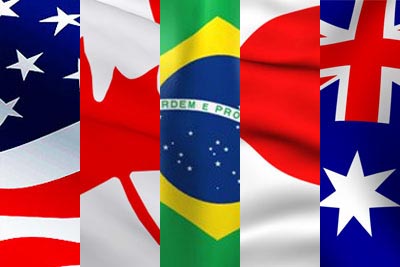 What is the Medical Device Single Audit Program (MDSAP)?
What is the Medical Device Single Audit Program (MDSAP)?
In 2012, The International Medical Device Regulators Forum (IMDRF) recognized the value in developing a global approach to auditing and monitoring the manufacturing of medical devices to ensure safe medical devices. It was at that point that the concept for the Medical Device Single Audit Program (MDSAP) was introduced.
The program’s main mission is to “...jointly leverage regulatory resources to manage an efficient, effective, and sustainable single audit program focused on the oversight of medical device manufacturers.” [International Medical Device Regulators Forum Medical Devices Single Audit Program, International Coalition Pilot Program sheet, January 2014]
Over the past 3 years and into 2016, significant progress have been made towards the full realization of the MDSAP program including the MDSAP Pilot Program which started January 1, 2014 and is expected to continue until the end of December 2016.
What are the Basics and Benefits of the Medical Device Single Audit Program (MDSAP)?
The MDSAP program is a comprehensive approach to quality system auditing and includes the development of an international coalition of countries devoted to pooling resources, technology, and services to enhance the safety and oversight of medical devices worldwide. Therefore the MDSAP program will be beneficial to manufacturers of medical devices who are interested in marketing and selling devices in those countries.
Who are the countries participating to the Medical Device Single Audit Program (MDSAP)?
In the context of the Medical Device Single Audit Program (MDSAP), medical device manufacturers’ quality management system can be audited once for potentially five different medical device markets:
The Food and Drug Administration (FDA) |
Brazil Agência Nacional de Vigilância Sanitária (ANVISA) |
Health Canada (HC) |
The Therapeutics Goods Administration (TGA) |
Japan’s Ministry of Health, Labour and Welfare (MHLW) |
Is the Medical Device Single Audit Program (MDSAP) mandatory?
The MDSAP program is voluntary and will rely on one single assessment of the manufacturers’ quality management system annually with a full certification cycle of three years. This will greatly reduce the number of regulatory audits and inspections a medical device manufacturer must participate in. The manufacturer will be able to choose an MDSAP recognized auditing organization. The goal of the single assessment will be to show compliance with the requirements of the five participating countries. Each country defines how the MDSAP results are implemented according to its legislation. After the MDSAP assessment the results (audit report) will be uploaded into a database that will be accessible by participating regulatory authorities.
If MDSAP becomes mandatory for one or more participating countries will manufacturers be expected to be compliant with regulations in a jurisdiction that it does not market?
The manufacturers are expected to be compliant only with the regulations for the jurisdictions where their products are marketed.
[Medical Device Single Audit Program Frequently Asked Questions, March 2016]
What is the link between the MDSAP Audit Criteria and ISO 13485?
The audit criteria of the MDSAP program will include the requirements of ISO 13485 and the applicable requirements of the participating regulatory authorities. In addition, other requirements will be included in the program such as specific requirements of each regulatory authority for product(s) and company registration(s), licensing requirements and any particular requirements related to the reporting of adverse events.
One important provision includes the ability for a manufacturer to exclude the requirements of any jurisdiction in which the manufacturer does not intend to supply medical devices. This means that at a minimum the requirements of ISO 13485 will be included in the MDSAP auditing criteria along with only the applicable regulations of the authorities in which the company intends to sell a device.
Is the CE marking certification included in the outcome of a successful MDSAP Pilot audit?
The European Union is not an implementing member of this program. However, some EU representatives are observers of the MDSAP pilot phase.
What is the future of the ISO 13485:2003 voluntary audit reports in the context of the Medical Device Single Audit Program (MDSAP)?
On February 11, 2016, the Food and Drug Administration (FDA) announced its decision that effective March 31, 2016; they will no longer accept ISO 13485:2003 voluntary audit reports with an audit end date of April 1, 2016 or later. The Food and Drug Administration (FDA) will continue to accept these audit reports with audit end dates of March 31, 2016 or earlier; however, reports must be submitted within 90 days following the conclusion of the audit.
After March 31, 2016, MDSAP will be the primary means for a medical device manufacturer that markets its devices in the United States to participate in a Third Party Audit program. Under MDSAP, the Food and Drug Administration (FDA) will accept MDSAP audit reports as a substitute for routine inspections.
How can GMED assist you with the Medical Device Single Audit Program (MDSAP)?
GMED applied to be part of the MDSAP program, and is an Auditing Organization Recognized by the MDSAP Regulatory Authority Council and has been performing MDSAP audits since April 2015. GMED is one of 10 organizations recognized to conduct MDSAP Audits. As we continue to move forward though the pilot program, we are able to keep our clients up to date on any changes, requirements and critical timelines that may impact your transition to the MDSAP program.
List of Auditing Organization Availability to Conduct MDSAP Audits
 If you are interested in the MDSAP Audit Program with GMED, Contact us.
If you are interested in the MDSAP Audit Program with GMED, Contact us.

 The USA
The USA Brazil
Brazil RESOLUÇÃO - RE Nº 2.347, DE 17 DE AGOSTO DE 2015
RESOLUÇÃO - RE Nº 2.347, DE 17 DE AGOSTO DE 2015 Canada
Canada Australia
Australia Japan
Japan
 Download our newsletter now and learn about :
Download our newsletter now and learn about : We're Hiring!
We're Hiring!